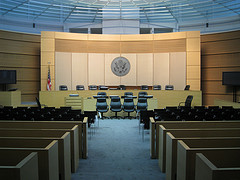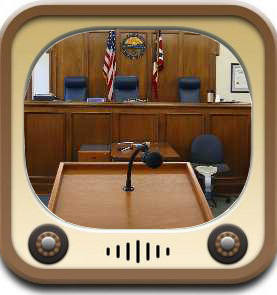Access to Courts
CMLP and Cyberlaw Clinic Ask Supreme Judicial Court to Affirm Public Right of Access to Inquest Records
Eric Robinson and Reporter Ron Sylvester Discuss Social Media in the Courtroom on Lawyer2Laywer
Using the Internet During Trial: What About Judges?
Trial Judges Impose Penalties for Social Media in the Courtroom
Copyright 2007-25 Digital Media Law Project and respective authors. Except where otherwise noted,
content on this site is licensed under a Creative Commons Attribution-Noncommercial-ShareAlike 3.0 License: Details.
Use of this site is pursuant to our Terms of Use and Privacy Notice.
content on this site is licensed under a Creative Commons Attribution-Noncommercial-ShareAlike 3.0 License: Details.
Use of this site is pursuant to our Terms of Use and Privacy Notice.


 The
The  CMLP contributor Eric P.
CMLP contributor Eric P. Over the past year, we've watched the courts struggle with Internet and social media use involving a variety of actors.
Over the past year, we've watched the courts struggle with Internet and social media use involving a variety of actors.
 Appeals courts in Colorado, Maryland
and New Jersey are the first to reverse jury
verdicts because of social media use by jurors during trial.
Appeals courts in Colorado, Maryland
and New Jersey are the first to reverse jury
verdicts because of social media use by jurors during trial.
 This afternoon, the Supreme Court
This afternoon, the Supreme Court  There are a couple of laws in California that the U.S. Supreme Court should consider before it announces tomorrow
There are a couple of laws in California that the U.S. Supreme Court should consider before it announces tomorrow  As part of our legal guide series on
As part of our legal guide series on 
 We
We 
Description:
On January 14, 2010, during the second day of a high-profile murder trial, Circuit Judge L. Page Haddock of the Fourth Judicial Circuit Court in Duval County, Florida, ordered a reporter for the Florida Times-Union's Jacksonville.com to stop live-blogging the trial. Reporter Bridget Murhpy had been posting her live updates to a Jacksonville.com page dedicated to the trial, which also hosts streaming video coverage of the trial.
The judge stated that that the computer was distracting the jury and that live-blogging violates a Florida Supreme Court order about how many transmitting devices are allowed in a courtroom. According to regular court practice in the jurisdiction, one television camera and one still photographer also were covering the proceedings, and the judge ruled that only two devices total were permitted. Later that day, counsel for the newspaper presented argument before the court and filed a written motion, but Judge Haddock denied its motion to allow live-blogging. (The judge's order and the newspaper's motion are contained in Exhibits 1 and 3 of Petitioner's Appendix.)
The next day, Judge Haddock issued an amended order (contained in Exhibit 5 of the Petitioner's Appendix), which appears to allow use of electronic media on a limited basis. According to MediaPost, the Times-Union is interpreting the new order as allowing it to alternate between taking still photos and live-blogging in the case.
On January 15, the newspaper filed an emergency petition with the District Court of Appeal for review of the trial court's orders.
Update:
1/20/10 - The District Court of Appeal granted the petition for emergency appeal and quashed the order denying the newspaper's motion for laptop access. He appellate court sent the case back to the trial court with instructions to allow the newspaper's reporter to use a laptop in the courtroom "unless the court finds a specific factual basis to conclude that such use cannot be accommodated without undue distraction or disruption." According to Jacksonville.com, this ruling was fiollowed by a new decision from Judge Haddock that leaves in place the reporting restrictions he imposed on January 15.